Daily Vocabulary Words: List of Daily Used Words
Hi there. Welcome to this special section @ Wordpandit.
Our endeavour here is straightforward: highlighting important daily vocabulary words, you would encounter in The Hindu. This is your repository of commonly used words; essentially, we are posting a list of daily used words. Hence, this has significant practical application as it teaches you words that are commonly used in a leading publication such as The Hindu.
Visit the website daily to learn words from The Hindu.
WORD-1: Revelations
CONTEXT: More revelations from the electoral bonds necessitate a thorough investigation.
SOURCE: [Source Not Provided]
EXPLANATORY PARAGRAPH: Imagine you have a secret treasure hidden in your backyard, and one day you discover it by accident. That’s like a “revelation” – it’s when something surprising or important is revealed or discovered.
MEANING: Surprising or significant discoveries or disclosures (noun).
PRONUNCIATION: rev-uh-LEY-shuhns
SYNONYMS: disclosures, revelations, unveilings, discoveries, insights
USAGE EXAMPLE:
1. The revelations in the document shed light on the company’s unethical practices.
2. She was shocked by the revelations about her friend’s secret past.
3. The novel’s ending had a surprising revelation about the main character.
4. Revelations about the true nature of the situation changed everything.
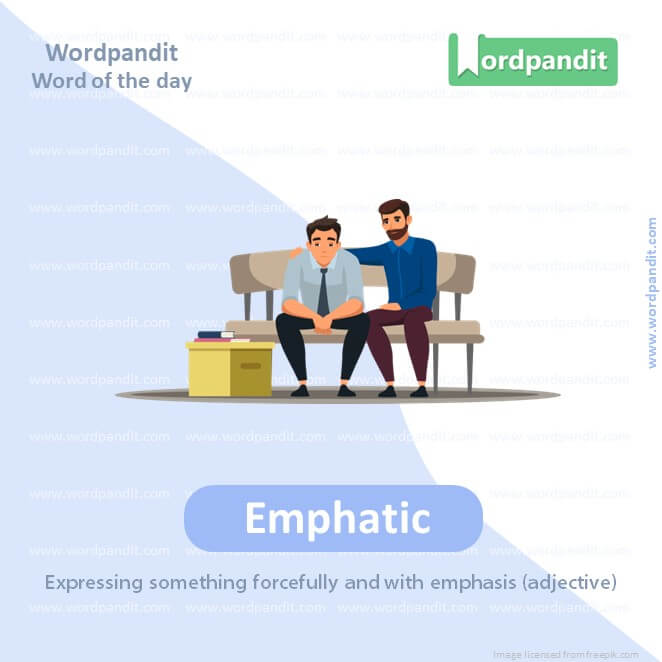
WORD-2: Emphatic
CONTEXT: Reserve Bank of India and Election Commission of India officials were emphatic in their apprehensions that the bonds scheme could be utilized in money laundering and tax evasion.
SOURCE: [Source Not Provided]
EXPLANATORY PARAGRAPH: Have you ever said something very strongly to make sure others understand how you feel? That’s being “emphatic” – expressing yourself with strong feelings or emphasis.
MEANING: Expressing something forcefully and with emphasis (adjective).
PRONUNCIATION: em-FAT-ik
SYNONYMS: forceful, strong, passionate, vigorous, assertive
USAGE EXAMPLE:
1. She made an emphatic statement about the importance of conservation.
2. His emphatic gestures emphasized his point during the speech.
3. The team’s emphatic victory secured their place in the finals.
4. The teacher’s emphatic warning got the students’ attention.
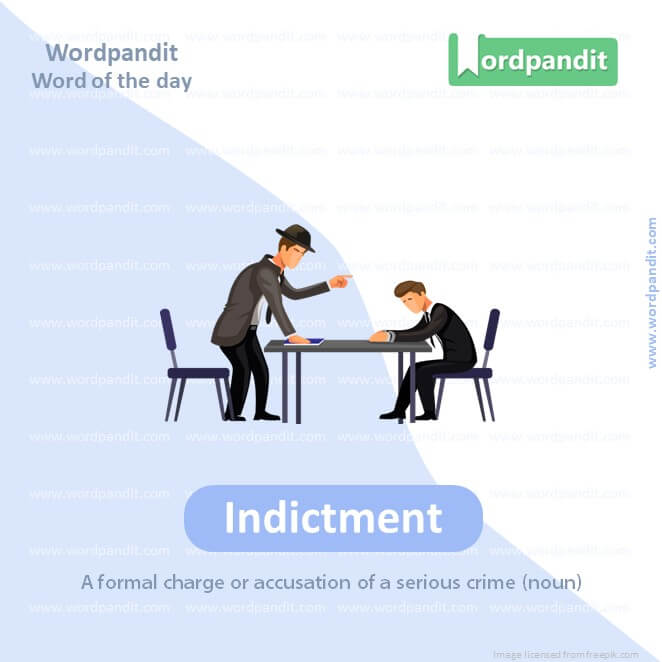
WORD-3: Indictment
CONTEXT: While the Court must be lauded for ending an opaque scheme with serious issues, the fact that large amounts were donated from dubious sources before every election is an indictment of the nature of campaign financing in place during this period.
SOURCE: [Source Not Provided]
EXPLANATORY PARAGRAPH: Imagine if someone is accused of doing something very wrong and has to go to court. The document that lists all the charges against them is called an “indictment.” It’s like a serious accusation that needs to be proven.
MEANING: A formal charge or accusation of a serious crime (noun).
PRONUNCIATION: in-DAHYT-muhnt
SYNONYMS: accusation, charge, allegation, prosecution, complaint
USAGE EXAMPLE:
1. The grand jury handed down an indictment against the suspect.
2. The indictment included multiple counts of fraud and conspiracy.
3. The politician faced an indictment for corruption.
4. The evidence presented in court led to a strong indictment.
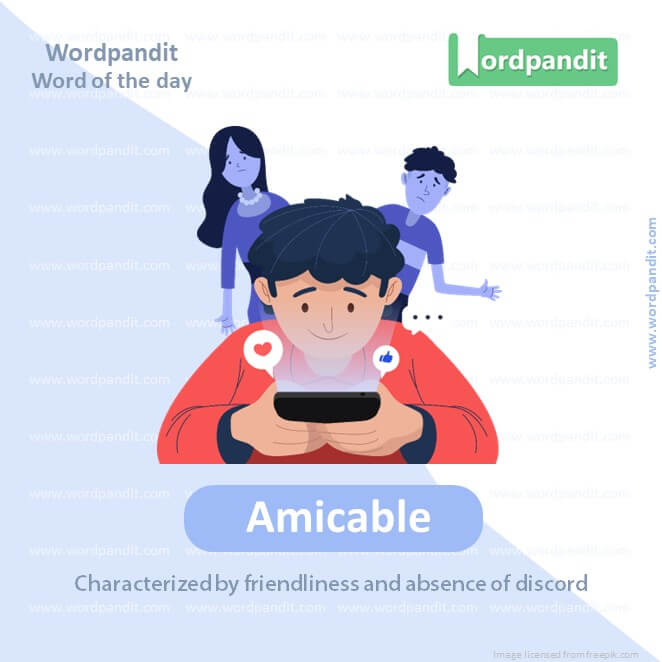
WORD-4: Amicable
CONTEXT: These parties managed to arrive at an amicable settlement as each made significant concessions to ensure unity against the Mahayuti coalition, comprising the BJP, the Eknath Shinde-led Shiv Sena, and Ajit Pawar’s NCP, that has yet to announce its seat-sharing arrangement.
SOURCE: [Source Not Provided]
EXPLANATORY PARAGRAPH: Have you ever had a disagreement with a friend but then talked and solved it peacefully? That’s called an “amicable” resolution – it means resolving problems in a friendly and cooperative way.
MEANING: Characterized by friendliness and absence of discord.
PRONUNCIATION: AM-i-kuh-buhl
SYNONYMS: friendly, cordial, harmonious, cooperative, peaceable
USAGE EXAMPLE:
1. After negotiations, they reached an amicable agreement.
2. Despite their differences, they parted ways amicably.
3. The divorce proceedings were conducted in an amicable manner.
4. Amicable relationships are key to a healthy work environment.
WORD-5: Enduring
CONTEXT: Mr. Thackeray’s switching sides to the Congress-NCP triggered new political forces, and the opportunistic shifts and splits within the Sena and NCP are turning into more enduring arrangements.
SOURCE: [Source Not Provided]
EXPLANATORY PARAGRAPH: When something lasts for a long time without breaking or changing, like a strong friendship that lasts for years, it’s called “enduring.” It’s about lasting and staying strong through challenges.
MEANING: Lasting for a long time, especially despite difficulties or challenges (adjective).
PRONUNCIATION: en-DOO-ring
SYNONYMS: lasting, enduring, persistent, continuing, resilient
USAGE EXAMPLE:
1. Their enduring friendship began in childhood and lasted a lifetime.
2. Enduring love can withstand the tests of time and adversity.
3. The company’s enduring success is attributed to its innovative approach.
4. Enduring peace requires constant effort and cooperation.
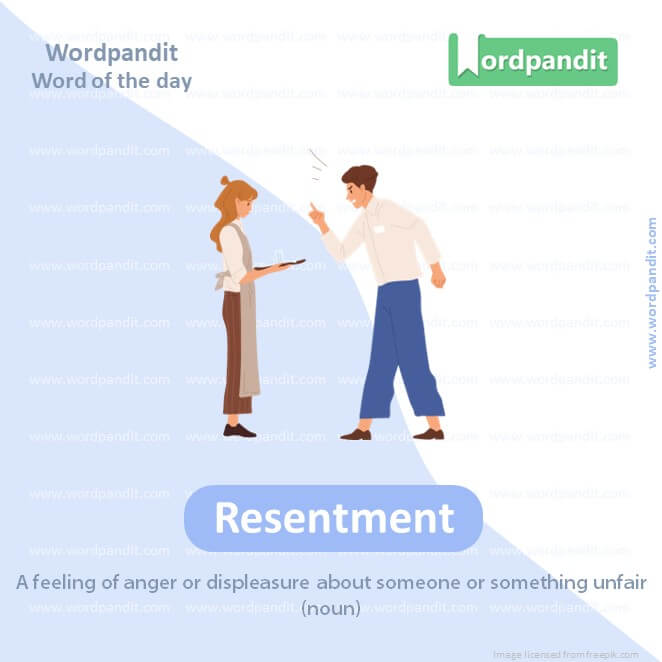
WORD-6: Resentment
CONTEXT: Troubles are far from over, however, and in many constituencies, the alliances will have to manage resentment and rebellion. The Pawar family is split between two parties, and Ajit Pawar has fielded his wife, Sunetra, against his cousin Supriya Sule in Baramati, the family stronghold.
SOURCE: Explanatory Paragraph: Imagine if someone treated you unfairly, and you felt angry and hurt about it. That feeling of being upset and angry is called “resentment.” It’s when you hold negative feelings towards someone because of something they did.
MEANING: A feeling of anger or displeasure about someone or something unfair (noun).
PRONUNCIATION: ri-ZENT-muhnt
SYNONYMS: bitterness, anger, grudge, animosity, displeasure
USAGE EXAMPLE:
1. He harbored resentment towards his former boss for passing him over for promotion.
2. Resentment built up over time due to unresolved conflicts.
3. Open communication can help resolve feelings of resentment in relationships.
4. Letting go of resentment is important for emotional well-being.
WORD-7: Distemper
CONTEXT: these and other diseases such as canine distemper affect wild animals and their conservation.
SOURCE: Explanatory Paragraph: Have you seen a dog or a cat with a fever and acting differently? That’s called “distemper” – it’s a sickness that can make animals sick and behave strangely.
MEANING: A disease or illness, especially one causing fever and behavioral changes in animals (noun).
PRONUNCIATION: dis-TEM-per
SYNONYMS: illness, sickness, disease, infection, ailment
USAGE EXAMPLE:
1. The veterinarian diagnosed the cat with distemper.
2. Distemper outbreaks can affect entire populations of animals.
3. Vaccination is important to prevent distemper in pets.
4. The shelter took in stray dogs with signs of distemper for treatment.
WORD-8: Sentinels
CONTEXT: This will be expanded to other sentinels such as places where animals (livestock or wildlife) congregate for a broader set of diseases to be taken up so that we mainstream these approaches to be a part of routine surveillance across human, livestock and environmental sectors.
SOURCE: Explanatory Paragraph: Imagine a guard standing watch at a gate, making sure no one unauthorized enters. That’s what “sentinels” do – they are like protectors or watchers who keep a close eye on things.
MEANING: Guardians or watchful protectors, especially those stationed to keep watch (noun).
PRONUNCIATION: SEN-tuh-nuhlz
SYNONYMS: guards, protectors, watchers, sentries, vigilantes
USAGE EXAMPLE:
1. The soldiers acted as sentinels, guarding the border day and night.
2. The ancient ruins were protected by stone sentinels.
3. CCTV cameras function as electronic sentinels in the shopping mall.
4. Sentinels patrolled the forest to prevent illegal logging.
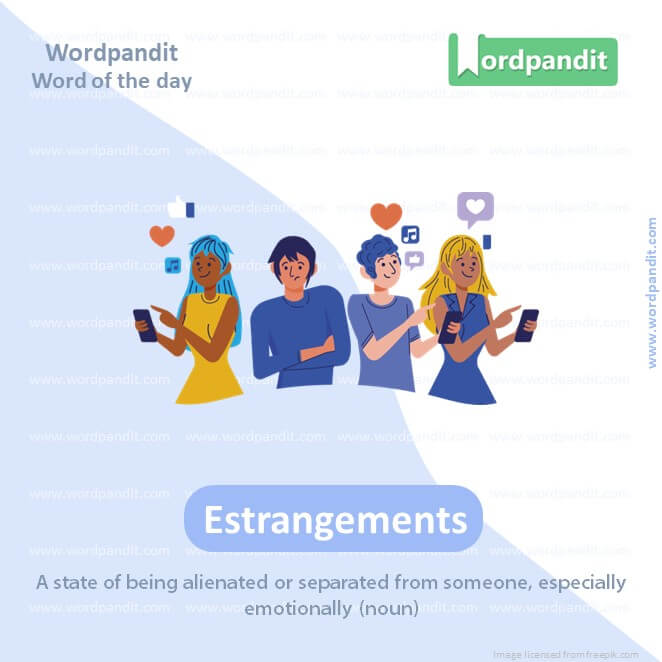
WORD-9: Estrangements
CONTEXT: Urban infrastructural developments have created estrangements rather than integration, based on social and class identities
SOURCE: Explanatory Paragraph: Have you ever had a friend or family member you used to be close to, but then you started feeling distant from them? That’s called “estrangement” – it’s when you become distant or separated from someone you were once close to.
MEANING: A state of being alienated or separated from someone, especially emotionally (noun).
PRONUNCIATION: i-STREYNJ-muhnt
SYNONYMS: alienation, separation, distance, isolation, detachment
USAGE EXAMPLE:
1. The estrangement between the siblings lasted for years.
2. The couple sought therapy to address their growing estrangement.
3. Misunderstandings often lead to estrangements in relationships.
4. Estrangement can be painful but sometimes necessary for personal growth.
WORD-10: Yielded
CONTEXT: The infrastructural developments around the road yielded enormous benefits by significantly increasing the flow of goods, people, and ideas too.
SOURCE: Explanatory Paragraph: Imagine you’re trying to push a heavy object, and it finally moves. That’s called “yielded” – it’s when something gives in or allows something else to happen.
MEANING: Giving way or surrendering to pressure or force (verb).
PRONUNCIATION: YEEL-did
SYNONYMS: surrendered, submitted, relented, conceded, acquiesced
USAGE EXAMPLE:
1. After negotiations, both sides yielded to a compromise.
2. The tree yielded to the strong winds during the storm.
3. He yielded his position to a more experienced candidate.
4. Pressure from the community yielded positive changes in government policies.
Vocabulary Meaning
In the ocean of language learning, ‘vocabulary meaning’ is akin to the colorful coral reefs that add depth and vibrancy to communication. Yet, infusing our interactions with this vibrancy is often a challenge for many language learners. The crux lies in effectively deciphering and employing the ‘vocabulary meaning’.
Learning ‘vocabulary meaning’ isn’t about merely gluing words to their definitions. It’s about forming a deep understanding and connection with these words that transcends rote learning. To gain a comprehensive grasp of ‘vocabulary meaning’, one needs to navigate beyond textbook definitions and commit to exploiting diversified resources such as novels, films, music, articles, and digital content. This allows one to encounter vocabulary in a variety of contexts and actual usage, giving deeper insight into their meaning.
However, understanding ‘vocabulary meaning’ involves another essential aspect—memory retention. Techniques such as spaced repetition and the Leitner System offer effective methodologies to maintain and consolidate the ‘vocabulary meaning’. Additionally, leveraging mnemonic strategies can help etch words into your memory by linking them with unique stories or imagery that are personal and easily recallable.
Another way of mastering ‘vocabulary meaning’ is by immersing yourself in the language. Engage in regular conversations with native speakers if possible or utilize language exchange platforms to practice your skills. This not only bolsters your understanding of how the vocabulary is used but also helps articulate the ‘vocabulary meaning’ in the societal and cultural contexts.
In conclusion, gaining a robust grasp of ‘vocabulary meaning’ is a journey rather than an end goal. It requires dedication, perseverance and most importantly, a multi-faceted approach that includes diversified resources, effective memory strategies, and real-life application. With these strategies in place, the depths of ‘vocabulary meaning’ are no longer daunting but become an enchanting exploration of language.










